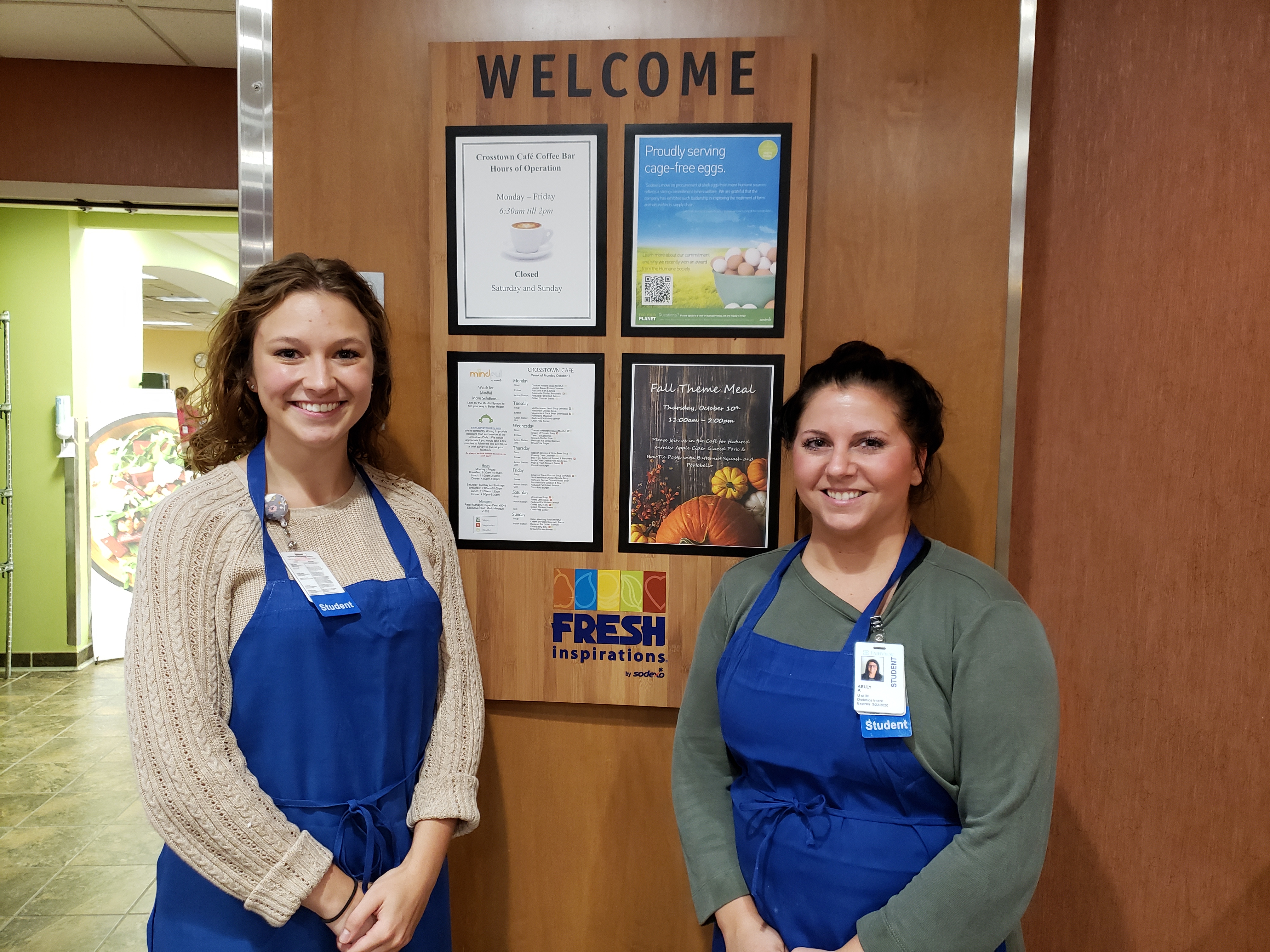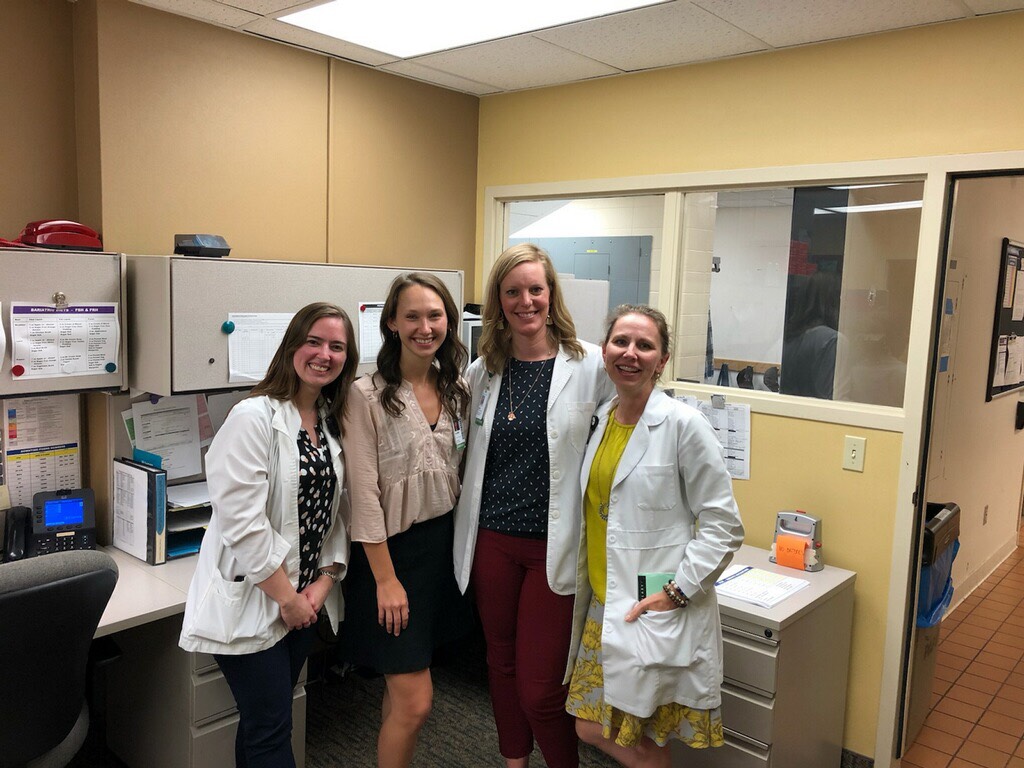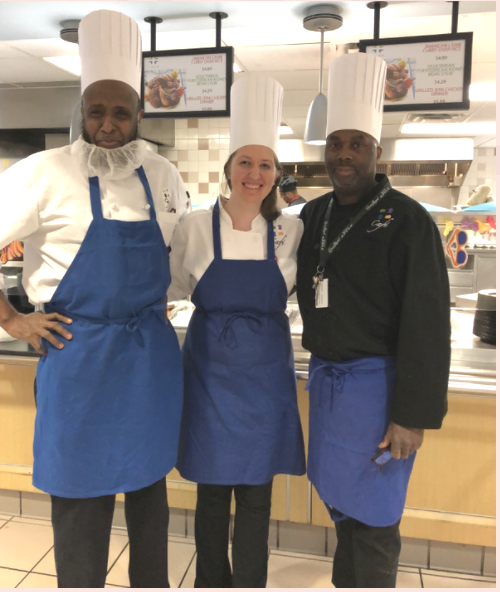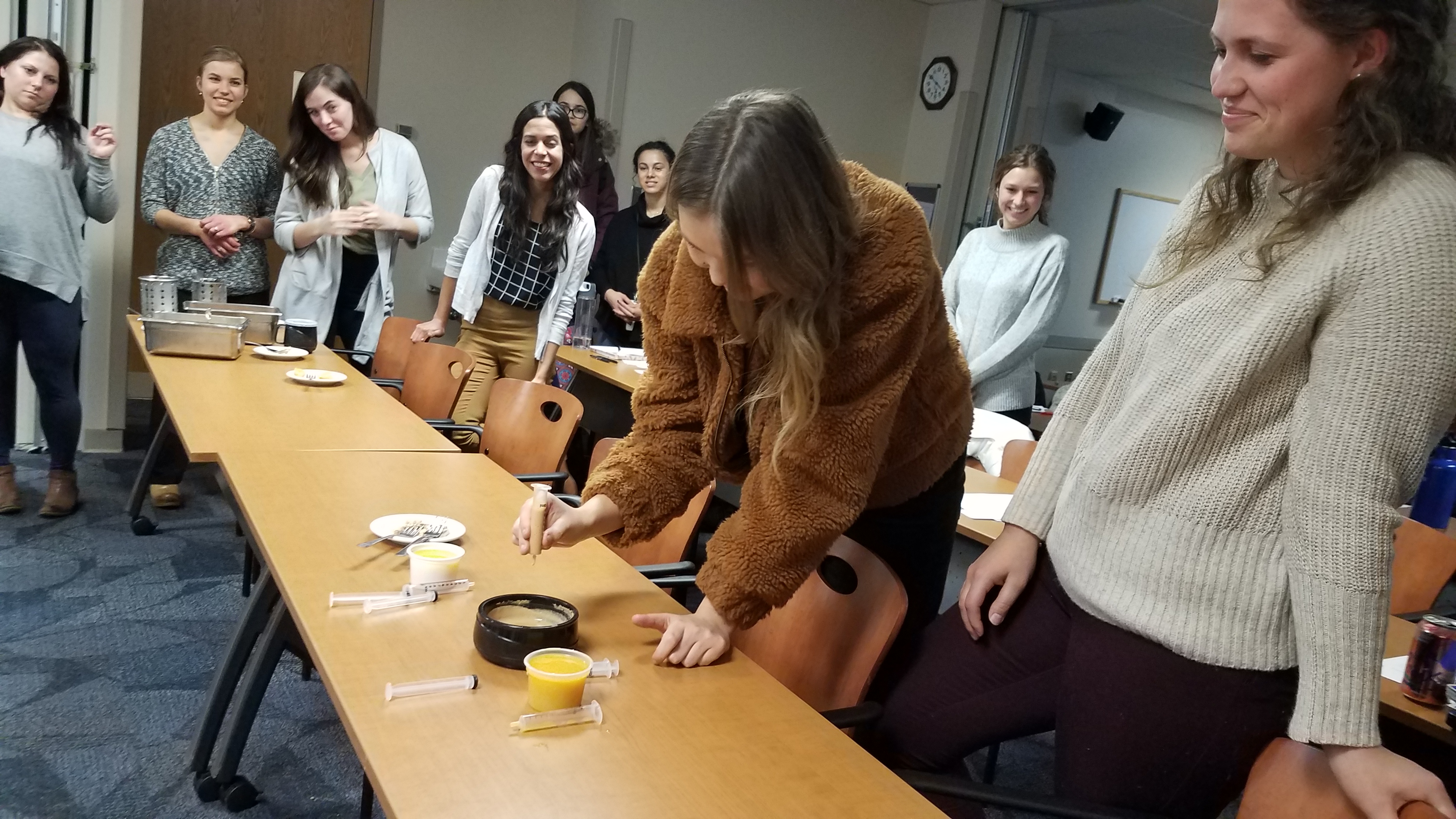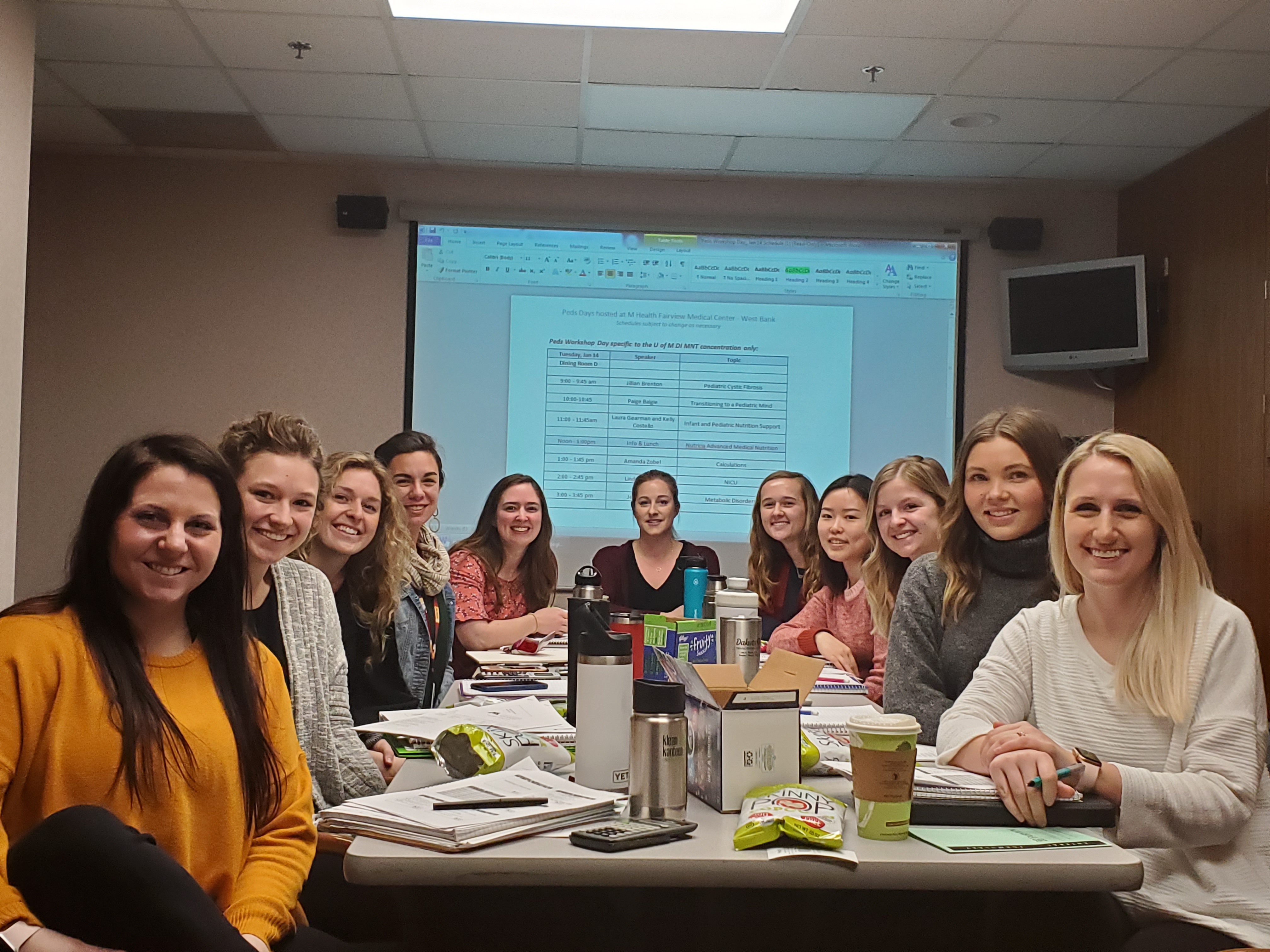Updated: December 2023
When does the next class of interns begin?
The DI program year for the Class of 2024 will begin on Monday, September 9, 2024, with graduation on *May 22, 2025.
*Exact date subject to change
How will this internship prepare me for taking the RD exam?
- Unique and hands-on experiences in practice settings
- Class days covering various topics included on the exam in great depth.
- RD exam prep resources and practice exams
What is your program’s pass rate for the CDR credentialing RDN exam?
Our program’s 3-year average for calendar years 2019-20, 2020-21 and 2021-22 is 99%!
What is a “typical day” like during the internship?
- No two days are alike. Interns will be at a variety of sites with different preceptors throughout the program, offering each intern the opportunity to have a multitude of experiences. The internship program is full-time, 37 weeks in duration, with interns working approximately 40 hours each week. Scheduling for each day will vary depending on the site and rotation assigned.
- On any given day, you could be writing patient chart notes, planning a theme meal with hospital nutrition services, or making educational materials for the players of a professional athletic team.
How much do interns work with each other during the internship?
Interns will work independently during the majority of rotations; several allow for collaboration with other interns.
Is there a class day for interns?
- Yes, and it is a favorite among interns!
- Class days are generally the first and third Mondays of the month, and designed with connection and care in mind.
- Class content varies, but routinely includes:
- Check-ins and conversations amongst program leadership and interns
- Guest speakers presenting on a variety of professional topics
- Intern-led case study presentations
- RDN exam and career preparations
What kinds of projects or assignments will I complete during this internship?
Prior to rotations, you will complete preparation designed to familiarize yourself with experiences and situations you will encounter in that setting. Each intern will complete a patient/client case study from within their concentration area, create educational materials, conduct a theme meal, and other enriching experiences within rotations. During the internship, you will also create a career portfolio to highlight some of these assignments and projects that you can then utilize in your resume or show potential employers.
How do you measure intern progress?
Progress is measured by preceptor and intern feedback, intern performance evaluations, self-evaluations and internship leadership feedback. Frequent opportunities to meet with program leadership exist. Interns will also provide peer evaluations/feedback for each other. Additionally, the program leadership is always available for concerns, questions, and guidance.
How are interns supported during rotations?
In addition to classes twice a month, interns will have the support of program leadership, fellow interns, and either their MNT or ED-TEP Coordinator for their respective concentration rotation experiences. Program leadership is available for any questions or concerns. You will meet your fellow interns during orientation and interns will often create a group chat or connect via a shared app. Concentration-specific Coordinators are also available for any concentration/site specific questions.
Do you survey current interns and graduates of your program on their approval rating of this internship?
Our program continually evolves. We are committed to program reviews, modifications, enrichment, and growth! Included in this process, program evaluations are completed by interns throughout the program year, upon graduation, and one-year later.
Additionally, we survey employers of graduates to seek any additional areas for program changes. Furthermore, feedback regarding the DI is also elicited from preceptors and partner sites.
Can I obtain financial aid for this internship?
- Although seated within the University of Minnesota, this program is not certified by the U.S. Department of Education for eligibility for Title IV student financial aid because it does not carry academic credit.
- Interns may be able to defer repayment of existing student loans. If necessary, a letter stating your placement in the dietetic internship program can be provided; please contact program leadership if needed.
Can you take out a loan for the internship?
- This internship does not carry academic credit, so it is not eligible for the national student loan program. Few, if any, banks offer personal loans for education purposes outside of the student loan system.
- This is true for many dietetic internship programs. We find that interns may benefit from taking a year to gain experience and save money by working full time in a position closely related to dietetics practice, before starting their internship year.
- Loan deferment: Interns have been successful in obtaining forbearance for current loans by using the "Medical or Dental Internship/Residency Forbearance Request" (Form # 1845-0018). Speak with your individual loan servicer who should provide the paperwork. This allows loan payments to be deferred until program completion (no interest is collected during this time for such deferment). Federal forms may change, so be sure to clarify if this form is still the one to use in successive years. It takes about 21 days to go through once submitted.
- We offer payment plans of 1, 2, 4, or 5 payments in order to break the total cost into smaller payments. Interns have been glad to have these options.
Does the internship provide housing?
Interns are responsible for finding their own housing. If you have questions about housing, reach out to program leadership. Also, you can reach out to fellow interns if you are looking for a roommate. Each program year, interns are introduced to each other in advance, which offers the opportunity to connect with one another, and for out-of-state interns to ask questions to those already living in Minnesota.
How do interns get to and from rotations?
Interns are responsible for providing their own transportation. It is recommended that you have a car as some rotations are farther away than others. For some rotations you may be able to use public transportation.
Link to Twin Cities Metro Transit route finder: https://www.metrotransit.org/home
Admission requirements state cumulative and DPD GPAs of 3.0 expected. Does this mean that anyone under a 3.0 will not be considered?
We encourage all those interested in our program to apply. We do not automatically disqualify applicants based on GPA alone. While we do consider GPA as one aspect, we pay attention to its various facets (i.e. trends, improvement of grades through academic career, and courses taken beyond didactic requirements). We also like to see balance outside of academics, too. This is why we review each category represented within the application, and look closely at your personal statement as well. We aim to seek well-rounded individuals, with excellent communication skills, flexibility, adaptability, and a positive-can-do attitude.
I graduated more than a year ago and don't have recent interactions with professors for an up-to-date letter of rec. Should I ask my career mentors/supervisors for the 2 letters?
Yes, you may opt to ask those who know your professional characteristics best and can highlight your demonstrated skills.
How can I be a more competitive applicant?
Gain relevant experience as an employee, intern, or volunteer. There are opportunities in clinical, community, research, and food service settings! These experiences will also help you find your interests and strengths in the field of nutrition. Also, write a strong personal statement to showcase your personality.
What makes a personal statement stand out?
Be genuine and highlight your passions and strengths. This is your opportunity to show who you are and describe what motivates you. Beyond what is on your resume and transcript, we want to get to know you. Work towards a personal statement that is a strong and accurate representation of who you are as an individual. Also, use the resources available to you! Many universities have career and internship services or writing centers that can help with your personal statement.
What do interns like most about the internship?
- The opportunity to apply knowledge from courses/work to a professional setting.
- The variety of rotations provide insight into many possible nutrition careers.
- Guest speakers present on interesting topics and open potential doors for nutrition careers.
What is considered as the most challenging part about the internship?
- The most difficult part for many interns is consistently changing rotations once you are getting comfortable in the current one.
- Learning to adapt quickly can be a challenge since interns want to learn as much as possible in the short duration of their rotations. However, it is very helpful to have other interns to talk to who understand the internship format and can share ideas on how to adapt quickly and make this part of the internship less challenging.
What makes a successful intern?
- Always prepared with completed homework and other required items.
- Not afraid to ask questions.
- Advocates for themselves and what they need and want to learn.
Where are past interns working now?
Examples from recent years:
- The Emily Program in MN and WA, as well as other Eating Disorders facilities in California, Denver, Texas, and Utah
- M Health Fairview throughout the various metro locations and practice areas (Medical/Surgical, Cardiac, Pediatrics, ICU, Relief or Casual, and Food Service Management)
- Medical centers in the Twin Cities, Iowa, Honolulu, Nashville, San Diego, Texas, and Washington
- Private practice startups in Boston and Hawaii, with a focus on ED awareness and treatment
- PR Agency Food Consultancy with RD Team for Nutrition Communications
- College and Professional Sports Programs
- Chicago facility as Foodservice Director
